“The First Amendment right to gather news is, as the Court has often noted, not one that inures solely to the benefit of the news media; rather, the public’s right of access to information is coextensive with that of the press.”
– United States Court of Appeals For the First Circuit, August 26, 2011
I spent a day in Freedom Plaza, a triangle of concrete adjacent to several high-end hotels with shiny black Mercedes limos out front three blocks from the White House. It’s Washington DC’s entry in the Occupy America phenomenon.
I came wearing two hats. One, I’m a Vietnam veteran member of Veterans For Peace who has actively worked for over a decade against our bankrupting wars. And, two, I’m an experienced journalist with a master’s degree who works in both images and words. I won’t take a back seat to anyone in what is known as the Main Stream Media.
The crowd of maybe 700 people occupying Freedom Plaza was fired up. The focus of the occupation was on the wars and the “one percenters” at the top of the economic heap in America who control our lives more and more as they pursue more and more “free market” profiteering.
This monster of greed has always existed in history, but this latest binge was unleashed by a hack Hollywood actor who became President of the United States 30 years ago. Everything has been deregulated and the ruthless financial reapings by this class led to a progression of bursting bubbles, an economic meltdown and a subsequent tax-payer bubble in the form of massive bailouts.
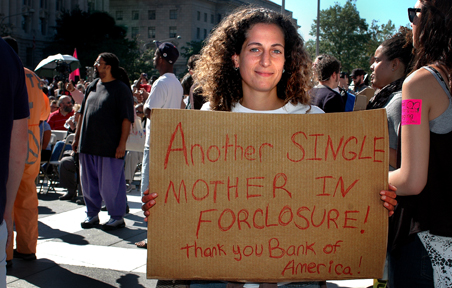 Andrea Egizi, one of millions of victims of the bailed out bankers and financiers. (All photos: John Grant)
Andrea Egizi, one of millions of victims of the bailed out bankers and financiers. (All photos: John Grant)
We all know the story by now. We know who got bailed out and who ended up holding the bag and losing their homes, people like Andrea Agizi, a single mother from Atlantic City I ran into in Freedom Plaza. Up until the recent wave of “occupations” across America, those who ended up paying for this free-market extravaganza were silenced and marginalized.
The slick financial wizards who sliced and diced Andrea’s mortgage for profit all worship the “free market.” They tend to be very liberal with those profits when it comes to financing political candidates who, once in office, lower their taxes even further. But a funny thing happened when these free marketeers saw the baroque money-making machine they’d created swirling in circles down the toilet — they suddenly turned into flaming socialists with all our tax dollars. After all, the machine had been fully endorsed, and shilled for, by the Federal Reserve’s Oracle at Delphi Alan Greenspan, and the nation didn’t want high-finance pirates jumping out of windows.
We’re living in the endgame of a huge Ponzi scam. Though they’re financed by billionaires like the Koch Brothers, even members of the right wing Tea Party recognize this top-heavy scam. All working people know it in their bones, and that even includes many of your average, working stiff police officers, the men and women on the front line ordered by those on top to control the angry victims of this multi-decade Ponzi scam.
There’s the sense suddenly that people have had enough, that things have gotten to the point people have little more to lose. If they’re not on the street they know why those on the street are there. The sense of bipartisan corruption is so profound that even the most conservative and cautious of citizens can no longer say there’s nothing wrong with the system. It’s staring all of us in the face.
On the plaza, I networked with friends and allies and, then, listened to David Rovics, singer songwriter from Portland, Oregon, sing metaphorically of bullies in the schoolyard and about the vegetable vender in Tunisia so fed up with a corrupt system he set himself on fire and set off a conflagration now called the Arab Spring movement.
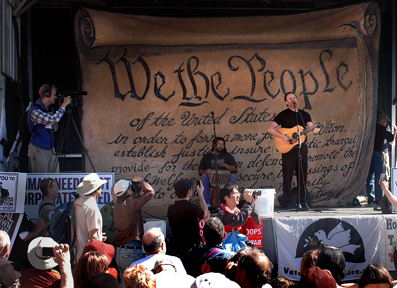 David Rovics singing of bullies and the Tunisian vegetable vender who set off a movement
David Rovics singing of bullies and the Tunisian vegetable vender who set off a movement
After that, hundreds of angry occupiers ventured from the Plaza and marched to the national headquarters building of the U.S. Chamber of Commerce, a notorious lobby and defender of corporations and free-market plunderers. The façade of the building featured huge letters that spelled out JOBS. This was a major focus of the demonstrators, since as a cathedral devoted to worship of a fictional free-market, jobs was not a priority for the U.S. Chamber of Commerce unless they somehow contributed to lining the portfolios of men in $2,000 suits.
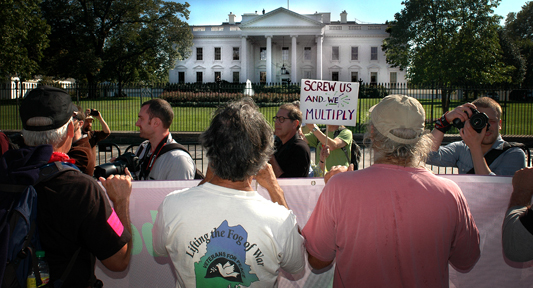 Occupation marchers pass the White House
Occupation marchers pass the White House
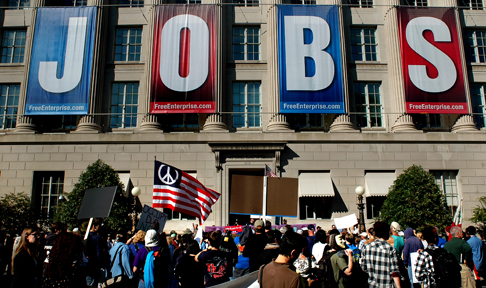 The march stops in front of the Chamber of Commerce building, asking, “Where are the jobs?”
The march stops in front of the Chamber of Commerce building, asking, “Where are the jobs?”
Meanwhile, making things even more interesting, a tall and lanky raving lunatic with a megaphone persisted on wandering through the crowd screaming “Jesus! Jesus! Jesus!”, annoying everyone except some of the cops nearby directing traffic, who could not restrain themselves from chuckling. They seemed glad they weren’t the only ones that day struggling to remain cool-headed in the face of opposition.
There’s always a circus atmosphere about street demonstrations, since they are by definition rude. No matter how you squeeze it, a street demonstration is not a venue for nuanced argument. People are fed up and angry, and they want to publicly express that anger.
So around 500 demonstrators pressed up to the huge wooden doors of the Chamber of Commerce. Ten police officers had been designated to hold the line and stand between the demonstrators and the doors. The demonstrators then unfurled a long banner right in front of the cops, making it so the crowd could no longer see the cops on the steps.
I began shooting to capture the scene. I worked the area from left to right, fore to aft, getting my master shots and, then, working in closer, focusing on individuals and interesting wide-angle compositions. I passed under the ropes holding up the long banner and got onto the three steps of the entrance at the far left end of the steps. Several other journalists were already there. I took a couple shots and stepped up to the top step for a higher angle. If I could arrange it, I wanted a shot that included the cops from the back and the demonstrators in front of them.
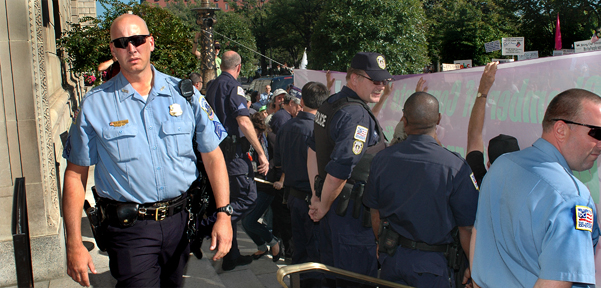 The sergeant who wanted to know: "Do you have a press pass?"
The sergeant who wanted to know: "Do you have a press pass?"
Then I noticed a tall, shaved-head police sergeant from the other side of the stairway coming right at me. I knew exactly what he wanted. Instinctively, I lined up a wide-angle shot and waited until he got to the spot in the composition where I wanted him. I hit the shutter and the fill-flash went off. I was wearing a T-shirt with VETERANS FOR PEACE and the organization’s peace dove helmet logo blazened across my chest.
“Do you have a press pass?” he asked.
“No, I don’t,” I said.
“Then you can’t stand here. You’ll have to move.”
At least three journalists with official press passes hanging around their necks stood on the steps behind me. Another VFP member stood nearby, also with a camera.
“I don’t have to go anywhere,” I told him. “The law says I have as much right to stand here as anyone with a press pass. I don’t need one; I have the First Amendment to the Constitution. That’s the law. It was clearly established a month ago in a First Circuit Court of Appeals ruling.”
I regretted I had not brought a copy of the ruling, which I could have nicely handed to him, emphasizing the appropriately underlined passages that pointed out in no uncertain terms how the First Amendment covered all Americans – not just members of the well-heeled, corporate press. The issue, I tried to tell him, was not MY lack of a press pass; the issue was HIS deciding I needed one to remain where I was.
I don’t presume to stand in her elevated category, but, still, I felt a little like Rosa Parks, who also knew she was right and who also was exploiting the predictable ignorance of those telling her to move to the back of the bus.
I looked the officer in the eye and he seemed to be a reasonable man. I figured he was under orders to hold his ground between what may have been for him a classic rock and a hard place. He was still insisting that I had to move.
“Look,” I told him. “You can throw me off this step if you want. But if you do that it’s you who are breaking the law, not me. I’m not interfering with your job; you’re interfering with me doing mine.”
I had concluded I was right and it was a principle I was going to stand up for to the bitter end. I laughed inside because I had earlier declared to the VFP comrade also on the step with me that I had no intention of getting arrested. But there I was, unwilling to budge. If this guy needed to escalate, bring out the pepper spray or lock me up, I was ready.
The sergeant and his squad were on their best behavior and likely under strict orders not to muss the hair on any demonstrators head that day. They didn’t want another wild pepper-spraying incident like the one that came to characterize the occupation in New York. So, the sergeant backed off and let me stay where I was. He sarcastically said, “Thanks for your cooperation” as he walked away.
I took a few more shots and, then, moved on. Maybe 20 minutes later I worked my way to the other side of the steps and climbed up on the ledge into a patch of flowers. I found myself right next to the same sergeant, who turned around and, sure enough, asked me, “Do you have a press pass?”
I laughed and said, “C’mon, we just went through that on the other side of the steps.”
“Oh, was that you?” he asked. I shrugged. This time, he cracked a smile. “OK, you can stand there.”
“Thanks,” I said, appreciative of his new magnanimity. I made nice in return. “Look, you guys are doing a great job here,” I said. And it was true. That day the police did their duty protecting the building and those inside without succumbing to a need to assault demonstrators. They remained detached and professional and did not take sides. Again, as working men and women one should not presume they’re not in sympathy with the spirit and theme of such an occupation.
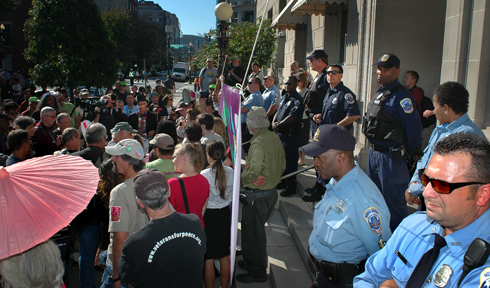 A shot taken of the crowd and the cops from the Chamber's flower patch
A shot taken of the crowd and the cops from the Chamber's flower patch
Men in expensive suits looked out the windows of an upper floor of the Chamber building. One could only imagine the fun they were having watching the angry peasants below in the street. Later, a dear friend of mine whose son was killed in Iraq confided in me that she had wanted to chuck a large rock through the windows at these men.
At any point the sergeant I confronted could have taken a different tack. He could have decided I was an obnoxious, disrespectful jerk who was directly challenging his fragile cop ego. If he’d escalated and drug me off to jail, I would have had to decide if I wanted to spend money to hire an attorney to file a lawsuit. If I was lucky not to run into a right-wing judge with an agenda, maybe months in the future I might win something for my grief.
The Growing Issue of Cops-Versus-Cameras
My confrontation was instructive but not very significant. The issue, however, is a critical one followed closely by people like Carlos Miller, who has beaten two arrests for videotaping cops and collects the most up-to-date stories of cops-versus-cameras at Photography Is Not A Crime. In one case, Miller interviewed a motorcyclist arrested for putting helmet camera video of a Maryland cop threatening him with a drawn pistol on You Tube. Radley Balko, a writer for the libertarian magazine Reason, is also hot on the issue and wrote an important article called “The War On Cameras.” Reason has also published information on “How To Record the Cops” that suggests civil liberties groups may be developing apps to make it easier to record cops. Compact, live-streaming video is becoming a powerful tool against police repression.
There is evidence of some progress. In Atlanta, following a successful lawsuit brought by a group called Copwatch, the police department has declared it will no longer harass people for videotaping cops and will train its cops in the issue. Other departments have also made efforts to follow the law — usually after embarrassing and expensive lawsuits.
The issue becomes especially volatile as smaller and smaller cameras are employed in either one-on-one confrontations with cops or in protest contexts such as the current occupations across the country. As in Chicago back in 1968 and in at least one melee in Wall Street recently, the question can become who’s promoting the chaos and doing the rioting, angry protesters pushing the envelope or frightened cops wailing with batons and pepper spray.
The fact is, when under pressure police seem to feel they don’t have to follow the law and recognize the rights of ordinary, non-credentialed citizens to record their actions. At worst, police agencies fall back on judicial harassment and intimidation. That’s what they did in the Simon Glik case cited at the top of this story.
Some may see this as a small matter, especially those inclined to shut down critical, left-leaning voices. But for those being shut down, the trampling of fundamental First Amendment rights is a first cousin to the huge cult of secrecy now rampant in the US. It’s another weapon of state control.
The clearly established rights of independent, un-credentialed citizens to function as journalists should be made clear to police leaders and to officers on the street. This is clearly not being done, since the Press Pass, issued by government bodies and sometimes by police, continues to be a ticket required for access to things the law says should be open to all.
The First Circuit Court in the Simon Glik case was very clear. Here’s some of its language:
“In our society, police officers are expected to endure significant burdens caused by citizens’ exercise of their First Amendment rights. … [The] First Amendment right publicly to record the activities of police officers on public business is established. …[P]eaceful recording of an arrest in a public space that does not interfere with the police officers’ performance of their duties is not reasonably subject to limitation. …[A] citizen’s right to film government officials, including law enforcement officers, in the discharge of their duties in a public space is a basic, vital, and well-established liberty.
”Moreover, changes in technology and society have made the lines between private citizen and journalist exceedingly difficult to draw. The proliferation of electronic devices with video-recording capability means that many of our images of current events come from bystanders with a ready cell phone or digital camera rather than a traditional film crew, and news stories are now just as likely to be broken by a blogger at her computer as a reporter at a major newspaper. Such developments make clear why the news-gathering protections of the First Amendment cannot turn on professional credentials or status.”
A downloadable PDF is available of the Glik ruling.
Last year the prestigious George Polk Award for Journalism was given to the anonymous videographer who captured a woman being shot in the head in a street demonstration in Iran. In this case, a prestigious national journalism award committee concluded a press pass was not necessary to qualify as a legitimate journalist.
Based on these kinds of established legal and professional understandings, the institution of the Press Pass should be banished from existence as irrelevant to the question who has the right, and who doesn’t have the right, to record police activities.
 Back at Freedom Plaza, a musician's shirt says it all.
Back at Freedom Plaza, a musician's shirt says it all.
